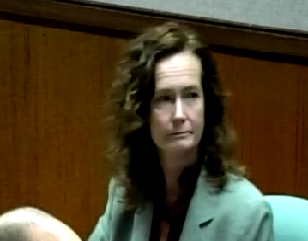Did SLO city attorney misinterpret state transparency laws?
February 24, 2019

Christine Dietrick
By KAREN VELIE
During Tuesday’s council meeting, San Luis Obispo City Attorney Christine Dietrick voiced her support of council members’ decisions not to disclose a fundraiser hosted by one of the applicants for a marijuana retail shop permit. [Cal Coast Times]
On Oct. 28, Helios Dayspring and his marijuana brand Natural Healing Center hosted a fundraiser for eight politicians including Heidi Harmon, Carlyn Christianson and Erica Stewart. Even though the cost of the fundraiser was over $1,500, none of the candidates disclosed the event on their financial disclosure forms.
After residents of the city voiced concerns about the lack of transparency, including the failure to disclose the fundraiser, Dietrick dismissed their concerns as unfounded saying she researched the issue and determined that neither Harmon, Christianson or Stewart were required to report the fundraiser as a non-monetary donation.
“Contributions as defined under the Political Reform Act don’t include the cost of campaign fundraiser events that are under $500,” Dietrick said. “So, I believe the particular fundraiser event was for eight separate candidates. Typically the way the FPPC handles that is to apportion the total cost among the beneficiaries.”
Dietrick said she concluded if the cost of the food was $1,500, and there were no other significant costs associated with the fundraiser, the cost divided by eight candidates fell below the $500 limit.
“And so under the city’s regulation, because we incorporate the contribution definition by the FPPC regs, not a combination as defined, and therefore not reportable was the conclusion we reached on that issue,” Dietrick said.
Generally, candidates must disclose all non-monetary donations, with a few exceptions. If a person hosts a fundraiser at their home, and the total cost is under $500, the candidates do not need to report the cost of the event.
However, according to the FPPC, all fundraisers with a cost over $500 require disclosure on Form 460, regardless of the number of candidates.
“For the home/office fundraiser contribution exception to apply, the total cost of the event must be $500 or less no matter how many candidates or committees benefit from the event,” according to a tip on the FPPC website.
A Cal Coast reporter sent a link to the FPPC website and the page where information about the fundraiser exemption is listed to Dietrick. She responded noting that reading the above tip did not clarify the issue for her.
“The tip in the link still seems somewhat unclear,” Dietrick responded. “We’ll also follow up with the FPPC on Monday to get clarification on whether any amendments need to be made to filings.”
In 1974, California passed the Political Reform Act to try to curb corruption by eliminating secret or anonymous contributions. It requires candidates to disclose both monetary and non-monetary campaign donations on Form 460.






The comments below represent the opinion of the writer and do not represent the views or policies of CalCoastNews.com. Please address the Policies, events and arguments, not the person. Constructive debate is good; mockery, taunting, and name calling is not. Comment Guidelines